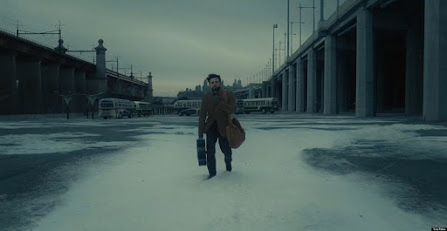"Russian Ark" and Historical Baggage
Russian Ark exists in this space between film and theater. It doesn’t try and fit inside the classic 3 act structure and instead lives inside the world of double metaphors and symbols.
The film opens with our narrator, who is our point of view, explaining that there has been an accident and he isn’t sure what exactly happened to him. We see a group get out of a horse-drawn carriage dressed in 19th-century garb obviously showing us that this is not our time period. Our narrator stumbles through the Winter Palace until he sees a man that sticks out almost as much as he does. Only known as “the European”, we later find out he is a French diplomat, he seems to be bound to this time and place similar to our narrator. “The European” seems to be an analogue for Marquis de Custine who wrote a book about Russia when he visited in the 1830s. This was the first major symbol I picked up on in the film even though I’m sure there are many I missed. Stuart Hall wrote about this idea of encoding films with signs that have a certain type of baggage to them “The point where already coded signs intersect with the deep semantic codes of a culture and take on additional more active ideological dimension.” This is felt when, or if, the audience makes the connection that “the European” is meant to be this famous author. Marquis de Custine certainly had his opinions on the Russians and their art styles, overall way of life, and their takes on European customs. This is shown in the movie multiple times over when he mocks the architecture of the palace and the lack of “breathing space” in the rooms. To me, this plays at somewhat of a comedic angle. He mocks the art around him in the Hermitage Museum only to see Catherine the Great in the next room over. She of course started the museum as more of a personal collection but it quickly grew.From Catherine the Great, we go through halls of magnificent statues, sculptures, and paintings until we wander into a room in which Tsar Nicholas is being offered a formal apology by and Iranian ambassador for the death of a Russian. Like I said earlier, this stuff plays for comedy but in a very dramatic and ironic way. This dramatic irony is felt the most, for me at least, when we see the family of Tsar Nicholas II’s running around without a care in the world. We know through the miracle of being alive after them that they are soon to be massacred by revolutionists. Sokurov seems very interested in this idea that no matter what we are to return to the tumultuous waves of the ocean. This idea that no matter what we do or create in our lives we are doomed to return to the entropy of the waves of the universe is a depressing and sobering idea. One that seems deeply cemented in the Russian view of life.

Comments
Post a Comment